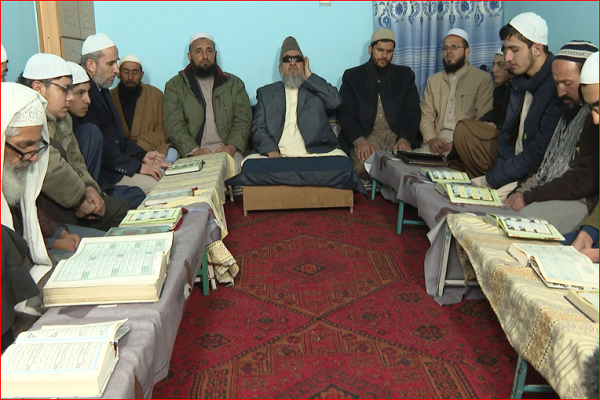AhlulBayt News Agency: Qari Barakatullah Saleem, a distinguished Afghan Quran reciter and scholar, passed away on Saturday in Kabul after suffering from an illness, his family confirmed.
Saleem’s death has been mourned by many Afghans and Muslims around the world, who have paid tribute to his life and legacy on social media. His students and colleagues have praised his service and efforts for the Quran and the Afghan nation.
“My teacher, Qari Barkatullah Saleem, has served his compatriots for many years and has made tireless efforts in this way,” said Naqib Rahman, one of his students.
“The death of Qari Barkatullah Saleem is a great loss for the Afghan nation,” said Amanullah Ahmadi, a religious scholar, Tolo News reported on Saturday.
Saleem, who was born in 1950 in Nangarhar province, east of Afghanistan, lost his eyesight at the age of 14 months. Despite this challenge, he showed remarkable talent and dedication to Quranic studies, guided by his father, Molavi Ghalajan, a respected scholar of his time. Saleem memorized the entire Quran by the age of nine and learned Tajweed from his father. He then attended a local Quran school, where he excelled in recitation and interpretation.
In 1964, Saleem traveled to Egypt with the financial support of a merchant who sponsored students to learn the Quran. There, he studied under eminent qaris such as Sheikh Mahmoud Khalil al-Hussary and Abul Ainain Shuaisha. He spent six years in Egypt, mastering ten recitation styles, a rare and remarkable achievement.
Upon his return to Afghanistan, he revolutionized Quran memorization techniques and became a prominent figure in religious circles through his work with Radio Kabul. He also founded the association of Afghanistan’s qaris in the 1990s and remained its head until his death.
Saleem was one of the most influential Quran teachers in Afghanistan, having trained over 800 Quran memorizers in the past 52 years. He stayed in Kabul throughout the changing political landscape, keeping away from politics and focusing on serving the Quran.
He expressed his concern about the lack of qualified qaris in Afghanistan, attributing it to the unfamiliarity with the principles of Tajweed and recitation styles. He recorded the Quran in 14 styles for television and authored 13 books, some of which are used as textbooks in schools and universities.
/129
Saleem’s death has been mourned by many Afghans and Muslims around the world, who have paid tribute to his life and legacy on social media. His students and colleagues have praised his service and efforts for the Quran and the Afghan nation.
“My teacher, Qari Barkatullah Saleem, has served his compatriots for many years and has made tireless efforts in this way,” said Naqib Rahman, one of his students.
“The death of Qari Barkatullah Saleem is a great loss for the Afghan nation,” said Amanullah Ahmadi, a religious scholar, Tolo News reported on Saturday.
Saleem, who was born in 1950 in Nangarhar province, east of Afghanistan, lost his eyesight at the age of 14 months. Despite this challenge, he showed remarkable talent and dedication to Quranic studies, guided by his father, Molavi Ghalajan, a respected scholar of his time. Saleem memorized the entire Quran by the age of nine and learned Tajweed from his father. He then attended a local Quran school, where he excelled in recitation and interpretation.
In 1964, Saleem traveled to Egypt with the financial support of a merchant who sponsored students to learn the Quran. There, he studied under eminent qaris such as Sheikh Mahmoud Khalil al-Hussary and Abul Ainain Shuaisha. He spent six years in Egypt, mastering ten recitation styles, a rare and remarkable achievement.
Upon his return to Afghanistan, he revolutionized Quran memorization techniques and became a prominent figure in religious circles through his work with Radio Kabul. He also founded the association of Afghanistan’s qaris in the 1990s and remained its head until his death.
Saleem was one of the most influential Quran teachers in Afghanistan, having trained over 800 Quran memorizers in the past 52 years. He stayed in Kabul throughout the changing political landscape, keeping away from politics and focusing on serving the Quran.
He expressed his concern about the lack of qualified qaris in Afghanistan, attributing it to the unfamiliarity with the principles of Tajweed and recitation styles. He recorded the Quran in 14 styles for television and authored 13 books, some of which are used as textbooks in schools and universities.
/129

